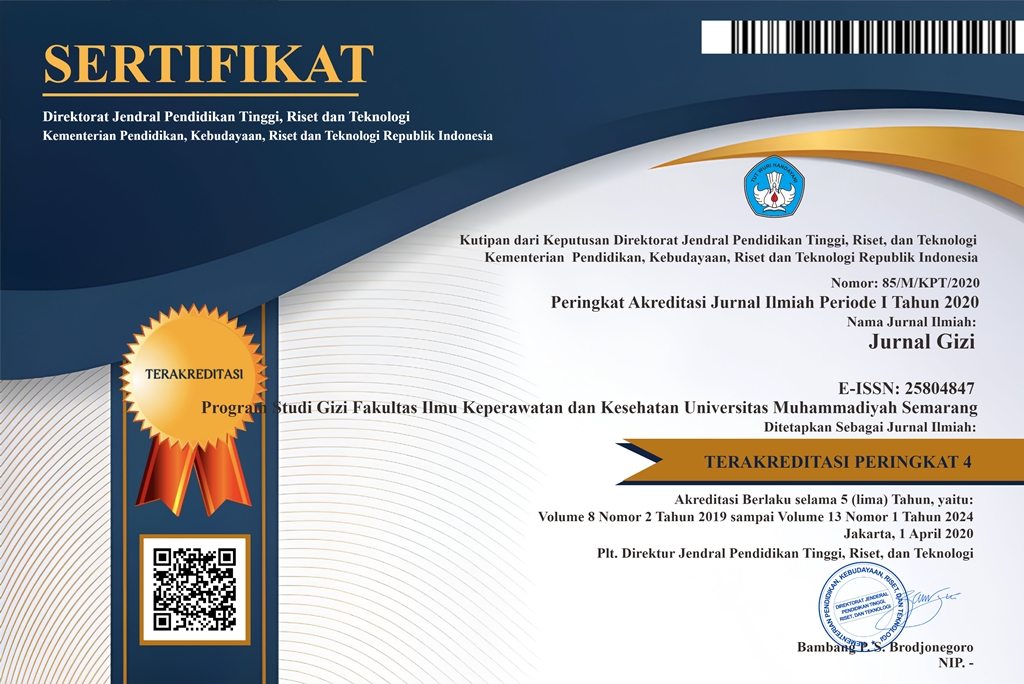Efektivitas Jenis Pelarut dan Metode Ekstraksi dari Daun Talas (Colocasia esculenta L. Schoot)
(1) Gizi Fakultas Ilmu Keperawatan dan Kesehatan, Universitas Muhammadiyah Semarang
(2) Gizi Fakultas Ilmu Keperawatan dan Kesehatan, Universitas Muhammadiyah Semarang
(*) Corresponding Author
Abstract
Taro leaves (Colocasia esculenta L. Schoot) are widely used as vegetables and herbal
medicines. In proving taro leaves as herbal medicine, taro leaves are changed in the form of
extract preparations. The choice of extraction method will affect the results of flavonoid levels
and antioxidant activity. Extraction methods that are widely used to extract taro leaves are
maceration and soxhletation. Maceration extraction method, the sample was immersed in 1000
ml of ethanol and 1000 ml of n-hexane for 3 x 24 hours. Every 24 hours replaced with a new
solvent. Extracts were made by soxhletation method using ethanol as solvent and the other using
n-hexane as solvent. The material that has been submerged in petroleum ether is wrapped in
filter paper and then tied with thread. Then it is put into the socket extractor. Furthermore, the
flavonoid and antioxidant levels were tested. The highest flavonoid content in taro leaves was
obtained by maceration method with ethanol solvent, as much as 12.836 mg QE/g. The highest
antioxidant activity was 91.812% by maceration method and n-hexane solvent. The maceration
method with n-hexane solvent can obtain taro leaf extract which has high antioxidant activity.
Kata Kunci—Antioksidan, Colocasia esculenta, Ekstraksi, Flavonoid, Pelarut
medicines. In proving taro leaves as herbal medicine, taro leaves are changed in the form of
extract preparations. The choice of extraction method will affect the results of flavonoid levels
and antioxidant activity. Extraction methods that are widely used to extract taro leaves are
maceration and soxhletation. Maceration extraction method, the sample was immersed in 1000
ml of ethanol and 1000 ml of n-hexane for 3 x 24 hours. Every 24 hours replaced with a new
solvent. Extracts were made by soxhletation method using ethanol as solvent and the other using
n-hexane as solvent. The material that has been submerged in petroleum ether is wrapped in
filter paper and then tied with thread. Then it is put into the socket extractor. Furthermore, the
flavonoid and antioxidant levels were tested. The highest flavonoid content in taro leaves was
obtained by maceration method with ethanol solvent, as much as 12.836 mg QE/g. The highest
antioxidant activity was 91.812% by maceration method and n-hexane solvent. The maceration
method with n-hexane solvent can obtain taro leaf extract which has high antioxidant activity.
Kata Kunci—Antioksidan, Colocasia esculenta, Ekstraksi, Flavonoid, Pelarut
Full Text:
PDFArticle Metrics
Abstract view : 215 timesPDF - 844 times
DOI: https://doi.org/10.26714/jg.11.2.2022.68-76
Refbacks
- There are currently no refbacks.

This work is licensed under a Creative Commons Attribution 4.0 International License.
Diterbitkan oleh: Program Studi Gizi (D3 dan S1)
Fakultas Ilmu Keperawatan dan Kesehatan
Universitas Muhammadiyah Semarang
Sekretariat: Jl. Kedungmundu Raya No. 18 Semarang
Contact Person : Hapsari Sulistya Kusuma, S.Gz, M.Si (+62 85 6 41 536 553)

This work is licensed under a Creative Commons Attribution 4.0 International License.









.png)
.png)